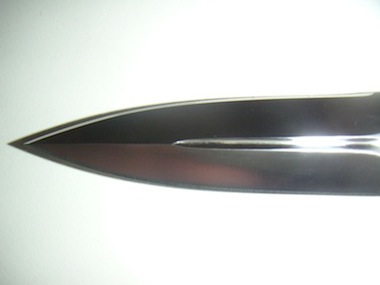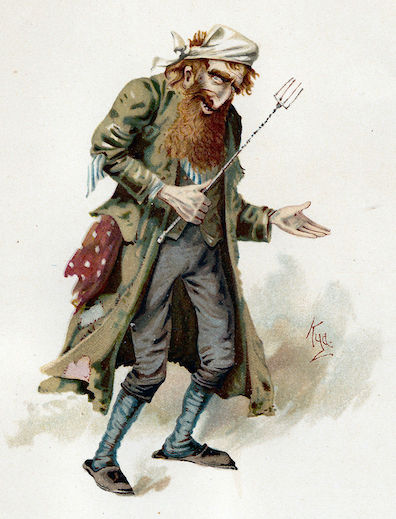As Mulligan affirms soon after calling down the stairs for
"Kinch," he is the source of this nickname for Stephen: “my
name for you is the best: Kinch, the knife-blade.” Ellmann
says that Oliver Gogarty
gave the name to Joyce and remarks that it imitated “the
cutting sound of a knife” (131). This seems pretty obscure,
but Mulligan's explanation certainly justifies hearing some
sort of association with knives in the word. Other meanings of
"kinch" may be worth exploring, not as alternatives but as
complements.
Mulligan uses his nickname for Stephen relentlessly: eighteen
times in Telemachus (to only six or seven instances of
calling him "Dedalus"), another five in Scylla and
Charybdis, and once in Oxen of the Sun. Stephen
appears to have accepted the sobriquet willingly enough. When
he is playing whimsically with the thought of navelcords in Proteus
he thinks, "Hello. Kinch here. Put me on to Edenville," and at
the end of the chapter he mocks himself as "Toothless Kinch,
the superman." Paying Bella Cohen in the brothel, he
generously includes Lynch and Bloom: "We are all in the same
sweepstake, Kinch and Lynch."
If Kinch primarily suggests the sharpness of a blade, that
association coheres with the many knife images in Telemachus:
Mulligan’s razor; the knife on which, “impaled,” he thrusts
slices of bread toward Stephen and Haines; the doctor's “lancet” and the
writer's “cold steelpen." One effect of all these
sharpened blades is to liken the Martello fortification
to Elsinore castle, where
hiding behind an arras or accepting a fencing invitation can
prove fatal, to the palace of Ithaca, where the floors run
ankle-deep in suitors' blood, and to the city of Troy,
site of horrendous slaughters.
But there may be other associations lurking within the word.
In a personal communication, Senan Molony proposes considering
the expression "kinchin lay," which refers to stealing money
from children. In Dickens' Oliver Twist, Noah asks
Fagin to recommend a risk-free form of stealing and rejects
his idea of snatching bags and parcels from old ladies (too
noisy, may scratch). Fagin thinks some more and suggests the
kinchin lay: "'The kinchins, my dear,' said Fagin, 'is the
young children that's sent on errands by their mothers, with
sixpences and shillings; and the lay is just to take their
money away––they've always got it ready in their hands––then
knock 'em into the kennel, and walk off very slow, as if there
were nothing else the matter but a child fallen down and hurt
itself. Ha! ha! ha!'"
If this expression has figured in Mulligan's creative process,
his nickname implies that Stephen is not only a sharp-witted
writer with a penchant for literary assassination, but also a
sponger who supports himself by lifting money off of easy
marks. And that too would fit the relationship of the two
young men. Stephen has borrowed money and goods lavishly from Mulligan, as from various
other acquaintances, and Mulligan shames him for eating all of the food that he
has provided at no expense—a role that allies him with Joyce's
mother, who sent postal orders whenever she could to relieve
the son who was going days at a time without food in Paris. Eumaeus
finds one more solicitous person, Bloom, offering food to this
young man who says, falsely, that he hasn't eaten for two
days.
Mulligan mentions the knife association, Molony observes,
just after remarking that Haines is "Bursting with money and
indigestion," a fact which may prompt his reflection that
Stephen is the intellectual equal of the Oxfordian but lacks
his financial means and should go to Haines and "touch him for
a guinea." This action of teasing out money, he notes, is not
unrelated to knife-blades, because in Aeolus Stephen
imagines the two old virgins from the Liberties putting one to
similar use: "They save up three and tenpence in a red tin
letterbox moneybox. They shake out the threepenny bits and a
sixpence and coax out the pennies with the blade of a
knife. Two and three in silver and one and seven in
coppers." In fact, Mulligan seems to associate cadging money
with a whole range of cutlery: "We must go to Athens. Will you
come if I can get the aunt to fork out twenty quid?"
This is all fantastically associative, but perhaps not beyond
the reach of what Frank O'Connor memorably called Joyce's "associative mania."

